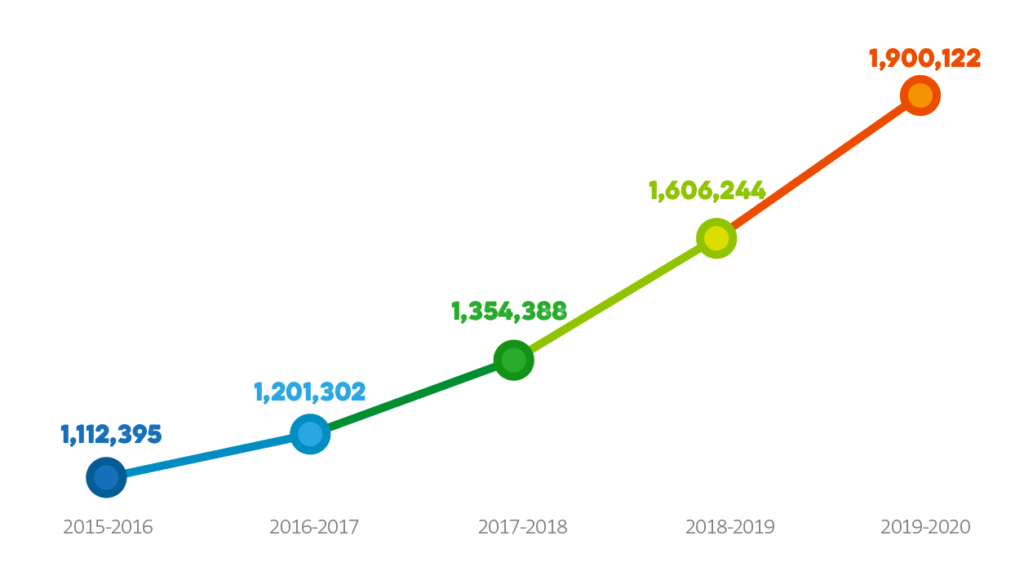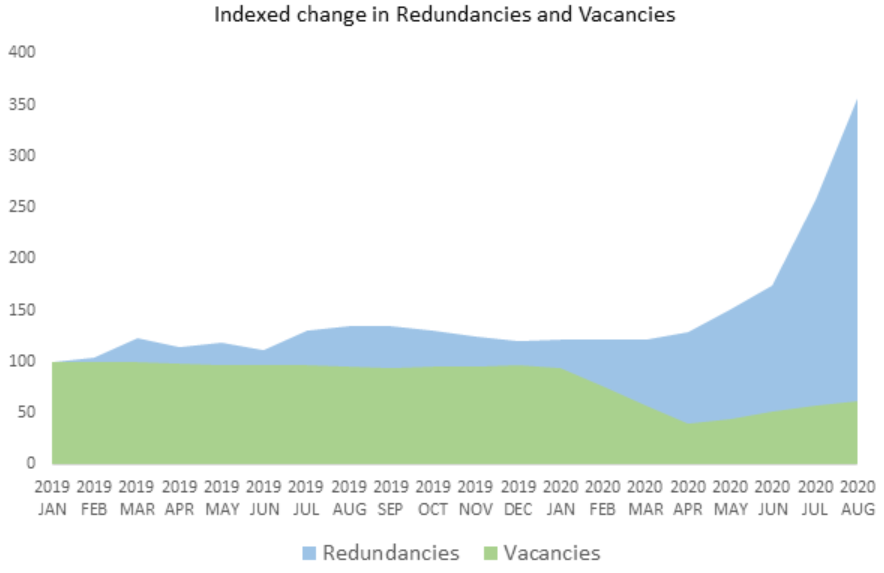We’re starting a new series where our team deep-dive into what’s happening in food banks. To kick things off, Research Manager Tom Weekes breaks down what we’ve seen in the first six months of the pandemic, and what we’re expecting this winter.
Yesterday we released figures showing that food banks in the Trussell Trust network have given out a record 2,600 food parcels a day to children since the start of the pandemic. Breaking it down further – a child needed support from a food bank every 34 seconds between April and September.
Clearly the economic consequences of the pandemic have been devastating, leaving many unable to afford the basics without further support. In many ways this has driven change for food banks – with many new people needing support, at the same time as they’ve had to make operational changes like extending opening hours, switching to deliver food and becoming Covid secure.
However, while some things have changed generally the underlying reasons why people need support have not. As before the crisis, the key issue is a fundamental lack of income leaving people destitute and unable to afford the essentials. Dramatic increases to the number of people applying for welfare support, shortfalls between people’s living costs and their income, and gaps in or lack of eligibility for support, have all driven levels of need.
95% of people that needed to use food banks during the pandemic were living in relative poverty after housing costs.
Food banks came into the crisis recording their hardest ever year
Over 1,300 centres distribute emergency food parcels to people in need in the Trussell Trust UK wide network. To receive a food parcel, you need to be given a voucher after being referred by an agency like Citizens Advice. This voucher contains information such as the number, and age of the people being supported. When these vouchers are fulfilled the data is uploaded by the food banks, allowing the Trussell Trust to evidence the number of people that are being supported by the network.
This data shows that food banks in our network saw successive years of increasing need coming into the crisis. In the last five years, food bank use increased by 74%. In 2019/20 alone there was a 18% increase on the previous year. 
Reshaping the landscape
Even from these record levels , the pandemic has reshaped the landscape of destitution and poverty in the United Kingdom. More than 5.7 million people were receiving Universal Credit in October, a 90% increase since March 2020. Our estimate based off work from Heriot-Watt University suggest hundreds of thousands of people will be swept into destitution by the end of this winter. During the pandemic food banks have been on the frontline of the crisis, and we reported a 47 per cent increase in the number of parcels distributed in the 6 months to September 2020, compared to the same period last year. In this period 38 per cent of parcels went to children – despite those aged 0-16 making up just 20 per cent of the UK population.
These figures represent just the tip of the iceberg, and do not include the countless people who were helped by people in their community, by independent food banks, and local authorities.
Looking to the future
At the Trussell Trust we expect this to be our busiest ever winter. We cannot accept this. The government must do everything it can to continue to protect people from falling into destitution and providing support to lift those experiencing it out.
Currently, for many people, work cannot be the solution. The below graph uses a baseline approach to show the change in both redundancies and the number of jobs available. Vacancies remain significantly below pre-pandemic levels, while redundancies have continued to increase.
**Source: LFS: ILO redundancy level (thousands): UK: All: SA: Figures refer to the number of people made redundant in the three months previous to their interview. So, for the data labelled as August 2020 that refers to the period from the beginning of April to the end of September 2020. Vacancies and Jobs in the UK: November 2020: Vacancy data refers to a three-month average. The latest data labelled as August 2020 is an average of August – October 2020.
This makes it more important than ever that we have a functioning safety net that fully supports people.
We need to:
Suspend benefit deductions until there is a fair system for repaying advance payments and other debts to the DWP.
- Between Mid-March and the 23rd June over one million advance payments for new claims or benefit transfers were made creating a substantial new population of people in debt to the DWP.
- As a sense of the scale of change, in May 2017 23,300 advance payments were made in total. In May 2020 this increased ten-fold to 246,840.
Lock in the £20 rise to Universal Credit, and extend it to those people currently excluded
- With millions more now receiving UC removing this would drive many into poverty and destitution. Our work with Heriot-Watt estimates that removing the uplift would increase use of food banks in our network by nine per cent next year.
- One in three (32%) households that were supported by a food bank in June or July and claiming benefits were not claiming UC, meaning they have not benefited from the uplift.
It’s not right that any of us are forced to food banks. But together , we can build a hunger free future. We’re asking anyone who wants to end the injustice of people needing food banks to join the campaign for a Hunger Free Future.




